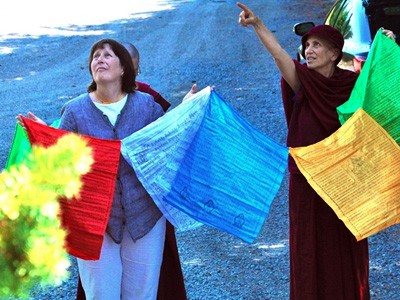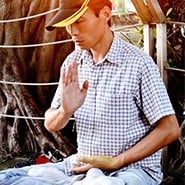Taking the vow of celibacy

Tracy is a lay practitioner who has been coming to the Abbey and assisting us in many ways since we moved to Newport. She requested to take the third precept as a celibacy precept. While celibacy is not at all necessary for Buddhist lay practitioners, you may find it interesting why she chose this.
The celibacy precept has a very special meaning to me on many levels. It is an opportunity to practice my faith with an awareness of dependent arising. By abstaining from sexual activity, I hope to create the causes someday to ordain—if not in this life, then perhaps the next. It will help me and others if I begin to condition my mind to think of others as something other than sexual objects. By training my mind to see others as beings with Buddha nature, I will treat them accordingly. Marginalizing someone as an object of pleasure and desire is harmful and can lead to a variety of harmful actions. And because birth and death revolve around craving and grasping, celibacy will help me create the causes and conditions for emerging from the twelve links or the “Wheel of Life.”
Being celibate will enable me to pursue the ideals I hope to embody. Most of the time we think first, “What can you do for me?” or “What good are they to me?” This subtle judgment does not go unnoticed in others! In fact, it is often not subtle in the least as we size each other up, primp and dress to impress prospective partners, and plan how to beat any competition to get what we want. It’s as if we were in some kind of race to look the best and be the most attractive even as we age and gain more wrinkles and experience other bodily deterioration. Because we have so little control over the aging of our bodies and the only enduring beauty is from within, stepping away from this game helps me realign my priorities to look beyond the superficial. It helps me to see others’ suffering and needs as well as their potential for immense good.
I have personally experienced feeling “used” by others as well as having “used” them in return. I hope, by removing this need to satisfy sexual craving, to instill a feeling of safety in others when they are with me. I will be with others without wanting anything from them because the demands to fulfill my needs are subdued. We all need love, compassion, and respect. I will convey this to wives, boyfriends, and couples by not interfering in their relationships. They will hopefully be able to feel confident that from my side there is no expectation of sexual encounters. Imagine seeing each person and being authentically and sincerely able to say with complete equanimity, “I want nothing from you. I wish only good for you.” This is what I need to practice.
Because I value bodhicitta and my precious human life, many decisions on a moment-by-moment basis are very important. Do I really need to take the time to appear to be a good sexual partner when I could die at any moment? How does time spent looking for “one special person” expand my ability to be universally compassionate? It often leads to the opposite: being exclusionary and judgmental by weighing people’s faults relative to my needs and standards for personal satisfaction. Also, relationships require a vow to love only one person! Jealousy, envy, and hostility often accompany this vow whenever a rival gets too close! Competition can come from anywhere—from a Brittany Spears poster to someone promoted at work or even our mother-in-law! My partner may also suffer from jealousy; what romantic partner would find comfort in my having lunch with a homeless man? Our Dharma practice and time for retreats are placed far second to our partner’s needs and wants.
What about ethical conduct? This is where I have found the most trouble. I have created many harmful actions in the name of getting and then keeping “The Perfect Soul Mate.” Most of my major indiscretions and lapses in ethics and virtuous conduct have revolved around my sexuality; for example, lying to get someone, lying to keep someone, and lying to get rid of someone… Then lying to get someone new! Lying to myself—yikes! And stealing—stealing someone’s affection from another person in a way that damages their relationship is also sexual misconduct. And although I haven’t done this or intend to do it, some people kill if a loved one commits adultery. This is the theme of most murder mysteries with sales in the billions! Intoxication is how I felt when “in love.” This kind of love is often to the exclusion of even affection for anyone else.
When I consider celibacy, it is like swimming out of deep murky water toward light and air, as if I am finally pointing in a wholesome direction. I am free to practice, free to love unconditionally, and free to smile at someone regardless of gender or age knowing I mean only a smile…


